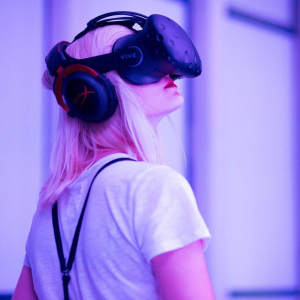Keynotes - UPDATED
The Journey to Content: Developing a model for understanding Video Game Interactions
Abstract
When we make games, we have many implicit understandings of what constitutes an interaction from a player and what constitutes their goal for playing; however, in trying to build a method of understanding a simple interaction (such as finding a key to open a gate) numerous limitations of our understanding were revealed.
This talk presents Prof. Mata Haggis-Burridge's and Thomas Buijtenweg's development of a new model for understanding video games and interactive media: the Journey to Content. The approach looks at core structural elements of digital games and breaks them down into constituents that help us to understand the player, content, gates, and keys. This model presents an unusual and revealing insight into both the structure of existing games and the assumptions that are usually sublimated by creators.
Unlike high-level analysis models, such as the MDA Framework and Bartle's Taxonomy of Players, the Journey to Content model examines the moment-to-moment interactions of players within both the system of the game and their wider societal context. Early application of the concepts from the model have shown that it has practical use for designers, and that it has potential for stimulating new game concepts. The model also has implications for metrics analysis and study/development of interactive systems beyond games.
This presentation is set for Thursday September 19, 2019
Short Biography
Prof. Mata Haggis-Burridge is the Professor of Creative and Entertainment Video Games at Breda University of Applied Sciences (BUAs) in the Netherlands. He works on inter/nationally funded research projects, and focuses his research on interaction design, narrative design, and diversity awareness in the commercial video game industry. He also advocates for policy change at a national and international level, such as through involvement with the Dutch 'kunst ≈ onderzoek' platform, and in the Horizon 2020 'Gaming Horizons' project.
He was the game and narrative designer for the award-winning video game drama 'Fragments of Him', and he is a member of the video game committee for the Writers' Guild of Great Britain (WGGB). He regularly speaks at both industry and academic conferences around the world, including GDC (US), Lyst (Finland), Game Happens (Italy), DRHA (UK), and more.
He is a British academic who has worked in and researched creative media for over 15 years, including writing animations for MTV2 Europe and games design for Electronic Arts. He still writes and consults for both large and small companies.

Professor of Creative and Entertainment Games
BUas
Breda, The Netherlands
Let's get a little bit serious
Abstract
We believe games can have many benefits on their players lives. Not only do games provide fun and relaxing entertainment , they can as well yield cognitive development benefits and be useful in teaching about real world things too. In this talk, we will discuss these benefits, some of the mechanics that reinforce them, and how as an industry we should embrace these opportunities, using some of our research work at Ubisoft as an example.
This presentation is set for Friday September 20, 2019
Short Biography
Olivier Dauba is a VP at Ubisoft Editorial, the structure that defines the overall product and player experience vision for the company. He notably leads an R&D structure that explore the link between games and learning, and explore new concepts using upcoming technologies. Olivier Dauba started his career in the aerospace industry, and has been a gameplay programmer, designer, producer and creative director on multiple Ubisoft titles over the last couple of decades, as well as an educator at IGAD.

VP Editorial at Ubisoft
Ubisoft
Paris, France
Game-Based Psychotherapy
Abstract
A game-based psychotherapy has its roots from the cognitive-based therapy proposed by the author Beck and it is used to refer to the willingness that players have in order to express their beliefs, thoughts, and experiences through game-playing, with the purpose of improving their lifestyles, well-being and quality of life. This talk explores using games in the psychotherapy process, , some game techniques that are used and the challenges that a phygital place can provide through the use of examples and a hands-on approach.
Short Biography
Liliana Vale Costa is a researcher at Digimedia - Digital Media and Interaction Research Centre and invited lecturer in Editorial Media, at the University of Aveiro. She is a passionate about research, digital painting, games and interaction design. During her PhD in Information and Communication in Digital Platforms and internship at the Disruptive Media Learning Lab, Coventry University, she has been involved jointly with Prof. Ana Veloso, Óscar Mealha, Michael Loizou and Sylvester Arnab in research related with the use of games for health-related wellbeing and active ageing. She is deeply involved into proxemics in phygital spaces, game-based psychotherapy, transmedia storytelling, and digital wellbeing.

Universidade de Aveiro
Aveiro
Portugal
Interactive Machine Learning for More Expressive Game Interactions
Abstract
Videogames are increasingly incorporating a diverse variety of sensors. Examples include DIY hardware games, VR sensors, smartphones, AR systems, smart watches and more. Despite decades of research on using sensors as game controllers, there are still no standard practices for how to design sensor-based interactions. It can be difficult for developers to implement accurate and robust sensor analysis when sensors are noisy or high-dimensional, or when the goal is to sense complex movements or actions. Further, players might want to customise sensor-based interfaces---similar to how they currently customise gamepads---to reflect their preferences or expertise, or to suit their own range of motion or abilities. However, current solutions provide little such functionality.
Curriculum Vitae
Phoenix Perry creates physical games and embodied experiences. Her work looks for opportunities to bring people together to raise awareness of our collective interconnectivity. Current research underway at Goldsmiths, University of London looks at leveraging our other senses, with particular focus on sound and skin based feedback to trigger affective response. A consummate advocate for women in game development, she founded Code Liberation Foundation. This organization teaches women to program games for free. Since starting in 2012, this project has reached over 3000 women in the New York and London areas between the ages of 16 to 60. Fostering professional growth and mentoring new leaders in the field, she strives to infuse the industry with new voices. Currently, she is a Lecturer in Physical Computing at Goldsmiths, University of London and the program leader of the Independent Games and Playable Experience MA, which she authored. Before that she was a Sr. Lecturer at HKU in the Netherlands and an Adjunct Professor at NYU Tandon School of Engineering, NYU Game Center and NYU ITP. She also founded a game studio which she ran for 3 years called Dozen Eyes Games focused on games and installations which created social change. The highlight of this project was the creation of a game with the US State Department to help newly arrived refugees in the US. Concurrently, she owned and ran Devotion Gallery in Williamsburg Brooklyn from 2009-2014 which was a vital cultural establishment producing over 200 classes, exhibitions and events. She is currently doing a PhD at Goldsmiths University of London and has an MS from NYU Tandon School of Engineering.
Virtual Reality as an Experiential Art Form
Abstract
How to tell a story to an audience when they are inside of it? One of the biggest questions when it comes to telling a story in virtual reality. Iris believes VR will bring us a new way of experiencing stories and therefore she is researching VR storytelling for the past couple of years. As a digital artist she approaches VR as a creative medium and uses it to build interactive stories to address social topics to the audience. In order to find VR's true potential we must understand that it is a medium on it's own and keep experimenting in building stories that are experiential. In VR we are not limited by any physical rules and therefore it gives artists full freedom in designing their stories. By doing so we might even find new ways of telling stories.
Curriculum Vitae
Iris van der Meule is a digital artist based in the Netherlands. She graduated her bachelor in animation with honors at art academy AKV St.Joost Breda. Currently she is following a master in animation at the Masters Institute of Visual Cultures at AKV St.Joost Den Bosch. During her bachelor she grew a fascination for virtual reality and educated herself in creating interactive VR experiences. As VR is a new storytelling medium, Iris is eager to research how we can use this medium creatively. With her fascination for socially relevant topics Iris creates poetic VR experiences that evoke emotion and raise awareness for the topics she addresses. Iris is a true VR pioneer when it comes to using VR as an art form and sees the potential of the medium forcreatives like her to bring storytelling and art to a new level.





